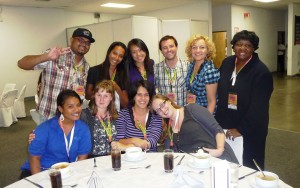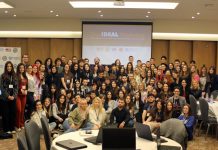Karina Chupina ’97
St. Petersburg, Russia/Tecumseh, MI
karina [dot] chupina [at] gmail.com
What a week it was! Mexico organized the World Youth Conference to welcome the International Year of Youth and its general objective was to find priorities of action on youth issues to be included in the international agenda for development beyond the Millennium Goals.
 On August 23-27, 2010, I represented the international non-governmental federation for national and regional youth organizations that are dedicated to hard of hearing young people (IFHOHYP) in Mexico at the NGO Global Meeting within the framework of the World Youth Conference. I happened to be the only delegate representing the Russian Federation and the only international NGO delegate to represent disability! This has to be changed. So I had a challenging task to make the voice of people with disabilities heard and seriously considered. I think I managed this well enough.
On August 23-27, 2010, I represented the international non-governmental federation for national and regional youth organizations that are dedicated to hard of hearing young people (IFHOHYP) in Mexico at the NGO Global Meeting within the framework of the World Youth Conference. I happened to be the only delegate representing the Russian Federation and the only international NGO delegate to represent disability! This has to be changed. So I had a challenging task to make the voice of people with disabilities heard and seriously considered. I think I managed this well enough.
What was the NGO Global Meeting about? The selected 208 young NGO leaders around the world came together to provide their input to decision-makers on the priorities to be put on the global agenda of youth development, as well as to hold the governments accountable about the promises established in the Millennium Development Goals (MDGs) and other international treaties.
Work, Consultations and Demands
After a long process of analysis and heated discussions on the needs of the young people worldwide, we gave our consensual position in a 16-page document, demanding that the governments and their various branches take every necessary action to recognize the young people as “people with rights” and guarantee their ability to fully exercise them.
This broad document offered a list of recommendations for the governments of the world to assure the development of adequate legislative frameworks on a national and international level that will guarantee the basic rights of the young people in the areas of food, education, health, including sexual rights and reproductive health, employment and free participation, among others.
Before the ugly truth that millions of young people confront every day, youth demanded that the governments pay particular attention to the marginal youth, including the young people at risk of being discriminated for reasons such as age and gender identity, sex, race or ethnicity, migration, disabilities, and beliefs, and facilitate their full participation into society. Also, youth requested greater commitment to reach the MDG and to recognize young people as key agents for the development of societies.
Taking advantage of the “International Year of Youth, Dialogue and Mutual Understanding” we asked the governments to invest at least five per cent of their national budget destined for defense in development programs for young people within their respective national budgets.
Furthermore, recognizing that young people can be key agents in conflict resolution, bringing together towns and promoting a culture of peace, we asked to make every possible effort to end the wars, occupations and conflicts that are unresolved in the world.
What Have I Managed to Bring Forward at the NGO Global Meeting?
As I was the only delegate officially representing disability issues, my role was to inform the delegates of the rights and concerns of youth with disabilities – and paying attention that “youth with disabilities” and their specific needs are mentioned explicitly in all conference statements (instead of a mere “vulnerable youth” generalization). I mentioned lack of explicit disability perspective in the MDG and suggested concrete actions that could be included in each Goal in the MDG outcome document. During the conference, it also became painfully obvious to me that lots of participants were not aware of the concept and the value of non-formal education (NFE) in all spheres related to youth work, participation, accessibility and employment. During workshops and breaks, I gave brief inputs on non-formal education (its difference from formal and informal education, its main features: voluntary participation, learner-centeredness, programs being based on participants’ needs and concerns, etc.) and about recognition of NFE in Europe.
Later on I took part in discussions in the following thematic groups:
– Poverty and Exclusion (contributed with concerns on youth with disabilities, accessibility and mechanisms for accessibility)
– Education (contributed with concerns on promotion of non-formal education, access AND accessibility of education for all young people, and human rights education)
– Employment (contributed with suggestions on employment creation policies and programs, capacity development, the role of formal and non-formal education, accessibility of young people with disabilities).
Finally, I was happy to contribute to the phrasing in the preamble by drawing attention to involving marginalized and excluded young people; consideration of the Revised European Charter on participation of Young People in Local and Regional Life (“We demand…”, clause 4.); supporting research on youth issues in order to facilitate evidence-based approach to youth policy (clause 12); supporting institutions that provide technical, political and financial support to youth-led NGOs and non-formal education (clause 21).
Conclusions?
Despite much excitement, the regret of all NGO Global Meeting participants was that there was still a substantial gap between the NGO Meeting Statement by young people and what governments agreed to later, in the Governments’ Declaration.
As one of the NGO Global Meeting organizers put it, “there were three key points which had been watered down: 1) Health and access to sexual and reproductive health services; 2) The request rather than insistence of independent Youth Councils; and 3) conditions that standards can vary locally (a get out clause for everything). We also were missing some key areas again: 1) on sexual and reproductive rights; 2) on recognizing more than one gender (explicitly); 3) any mention of LGBT rights.”
Still, many of us, myself included, were happy with the contribution we made to the World Youth Conference, our efforts to raise visibility of young people and our work together during these intense, mind-boggling days.
I offer you these links so you can learn more about the World Youth Conference and its outcomes atwww.youth2010.org. You will see the mentions of disability, accessibility and non-formal education throughout the Statement of the NGO Global Meeting at:http://www.coe.int/t/dg4/youth/Source/Resources/Documents/2010_WYC_NGO_Statement_en.pdf.
For more details of the NGO statement, go to:http://www.youthforum.org/images/stories/Documents/United_Nations/ngo-statement-wyc-2010-english.pdf
And to read the Governments Declaration:
http://www.youthforum.org/images/stories/Documents/United_Nations/Guanajuato_Declaration_2010_EN.pdf
The very positive outcome of the NGO Global Meeting was strengthening the voice of youth on international level, and learning to use the statement as a lobby tool in the future. If you happen to take part in the World Youth Conference in the future, be sure to apply the lessons learnt.






